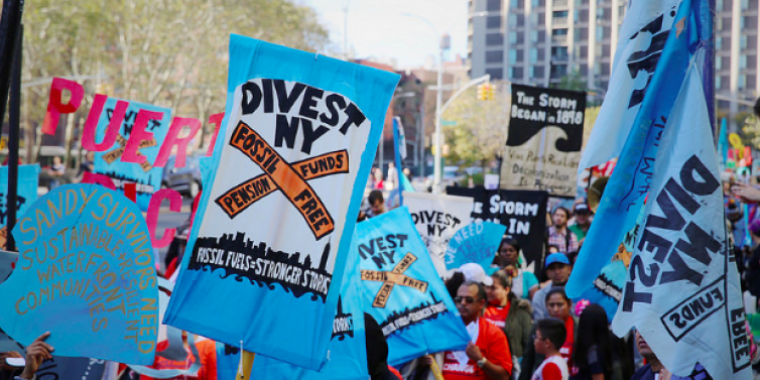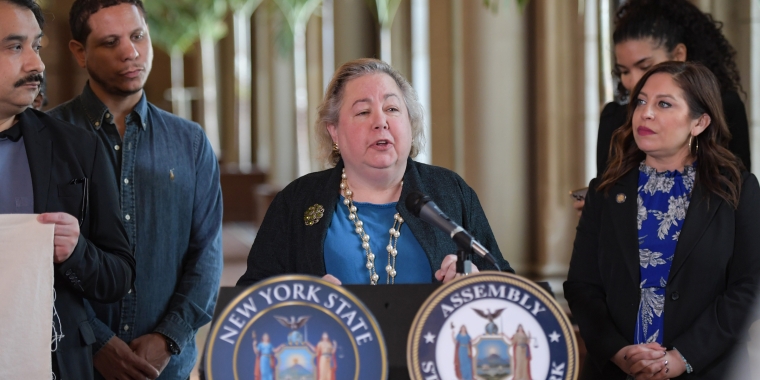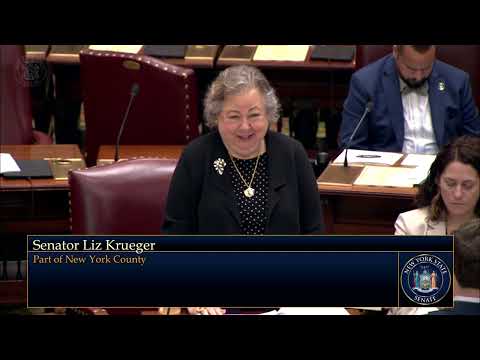
Krueger And Ortiz Introduce Updated Fossil Fuel Divestment Act
December 3, 2019

Albany – Today, as world leaders are meeting for the UN Climate Change Conference in Madrid, State Senator Liz Krueger, Chair of the Senate Finance Committee, and Assembly Assistant Speaker Félix W. Ortiz announced the introduction of a revised version of their Fossil Fuel Divestment Act (S.2126-A/A.1536-A). The changes to the bill, based on feedback from the State Comptroller's office, advocates, and investment experts at an April 30th hearing, are designed to make it a more effective tool to address stranded asset risk, and place the bill on a firmer footing regarding its constitutionality and the pension fund's fiduciary obligations.
"The climate crisis is here – fiduciary and moral responsibility require the process of divestment to begin now," said Senator Krueger. "The writing on the wall could not be clearer: fossil fuel producers are a bad long-term investment. Divestment will protect workers and retirees from the rapid devaluation these companies will suffer in the coming energy transition. We have heard the concerns of the Comptroller and our legislative colleagues, and taken the advice of numerous financial and investment experts, to make this bill stronger. It's time for New York State to put our money where our mouth is, and continue our commitment to climate leadership by divesting from fossil fuels.”
“New York State has an obligation to the investors in the Common Retirement Fund and to Planet Earth to divest from fossil fuels,” said Assistant Speaker Ortiz. “As a climate protection leader, investing state retirement funds in companies whose actions harm the environment is simply wrong. We need to take every action possible to mitigate continued damage to the environment and protect retirement investments. The revisions to the Fossil Fuel Divestment Act will help ensure those priorities are met.”
The updated Fossil Fuel Divestment Act, which has 28 co-sponsors in the Senate and 39 in the Assembly, would direct the New York State Comptroller to divest the state employee pension fund, called the Common Retirement Fund, from all direct and indirect investments in companies that meet the bill's definition of coal, oil, or gas producers. Divestment from coal producers would be completed within two years; divestment from oil and gas producers would be completed within five years. Divestment would be subject to a Determination of Prudence issued by the Comptroller, certifying that divestment complies with his fiduciary obligations and the "prudent investor rule" as defined in state law.
“Every day, it becomes more urgent for New York State to cut its fiscal ties with powerful polluters that are generating greenhouse gas emissions," said Rich Schrader, NY Legislative Director at the Natural Resources Defense Council. "There is no time to wait: we need our leaders to take bold action now to ensure New York can meet its ambitious climate goals and ensure our energy policies represent the interests of our children and grandchildren. Passing the divestment bill this session would be a huge leap forward.”
“Comptroller DiNapoli is violating his legal duty to preserve the long-term health of New York state workers’ retirement accounts," said Clara Vondrich, director of Divest Invest. "Fossil fuels are in decline, underperforming the market and poised for a crash that the Bank of England says could cost investors up to $20 trillion. Already, the NYSCRF would have been $22 billion richer had the Comptroller heeded calls to divest a decade ago. He must pull out now or face the consequences, not least of which is potential legal liability for gambling with pensioners’ hard-won savings.”
“It's beyond hypocritical for New York State to invest in Exxon when our own Attorney General is suing them for fraud,” said Dominique Thomas, New Yorker and organizer with 350.org. “With this strengthened divestment legislation, and Comptroller DiNapoli's reckless failure to act, it’s time for state senators and assembly members to choose a side: are you with the people of New York or are you with fossil fuel billionaires?”
Supporters of divestment argue not only that it is no longer acceptable to financially support the extraction of climate-destabilizing fossil fuels, but also that the state pension fund is exposed to increasing financial risk by holding onto fossil fuel companies, which stand to lose significant value as the world acts to mitigate climate change. A recent report from Carbon Tracker revealed that no major oil company is making capital investments that align with the goals of the Paris Agreement to keep global warming below 2°C, let alone the now broadly accepted goal of 1.5°C. The Common Retirement Fund has lost more than $260 million in coal investments since 2010, and a recent study by Corporate Knights estimated that the Fund is valued at $22.2 billion less than it would have been had it divested from fossil fuels in 2008 and redistributed those monies across the rest of the portfolio.
Whereas the previous version of the bill required the Comptroller to divest from all companies listed in the Carbon Underground 200, the new bill requires the creation of an exclusion list of fossil fuel producers defined by several risk factors: the percentage of revenue derived from fossil fuel production, the percentage of global fossil fuel production for which the company is responsible, and the potential future carbon dioxide emissions contained in the company's reported coal, oil, or gas reserves.
Companies placed on the exclusion list would have an opportunity to contest their inclusion, either by demonstrating that they had been added in error, or by presenting clear and convincing evidence that they will have moved out of fossil fuel production and no longer meet the list criteria by 2030. In other words, fossil fuel producers that are making real and demonstrable strides to wind down their oil, gas, or coal production in a timely fashion will not be subject to divestment.
The new bill also contains a significant change to protect the Comtproller's investment discretion and address concerns about constitutionality. Before divestment can commence, the Comptroller must issue a Determination of Prudence, stating whether he believes that divestment from any or all of the companies on the exclusion list complies with his fiduciary responsibility and the "prudent investor rule" defined in state law. If the Comptroller determines it would not be prudent to divest from any particular company, that company would be removed from the exclusion list. All companies removed from the list would be reconsidered for exclusion within five years.
Worldwide there are currently 1,145 institutions that have committed to divest, including universities, faith-based organizations, non-profits, municipalities, philanthropic organizations, and national and state pension funds, controlling $11.54 trillion in assets. In 2018, Ireland became the world's first nation to fully divest its $10.4 billion sovereign wealth fund from fossil fuels.
The list of institutions involved in the divestment movement includes the Teachers Retirement System of the City of New York, New York City Employees Retirement System, California Public Employees' Retirement System (CalPERS), California State Teacher's Retirement System; Pratt Institute, Union Theological Seminary of New York City, The New School, and Stanford and Syracuse Universities; the cities of Seattle, San Francisco, Portland, Minneapolis, and Ithaca; the World Council of Churches, and the United Methodist Church USA; Guardian Media Group, the Rockefeller Brothers and Family Funds, The Blumenthal Foundation, and the sovereign wealth fund of Norway. A full list of divestment commitments can be viewed here.
The global divestment movement is having an impact on fossil fuel producers, in part through the process of stigmatization, which can damage enterprise value by discouraging engagement by business partners, employees, lenders, governments, politicians, etc, as well as leading to restrictive legislation. The increased scrutiny tar sands have received as a result of divestment and allied stigmatization campaigns was a contributing factor to Exxon’s decision to write down the value of its tar sands reserves. Peabody Energy, a coal producer that went bankrupt in 2016, said of the divestment movement: “the impact of such efforts may adversely affect the demand for and price of securities issued by us, and impact our access to the capital and financial markets.” Shell now cites divestment as a major material risk to its current business model, which could lead to project delays or cancellations and could affect its ability to access capital.
The Common Retirement Fund, with $210.5 billion in assets as of March 31st, 2019, has invested $2.7 million in Peabody Energy, $133 million in Shell, and over $1 billion in Exxon, and has between $6 and $12 billion directly or indirectly invested in all fossil fuel producers.
“We applaud Sen. Krueger and Assm. Ortiz’s continued leadership to divest the New York State pension fund from the $11 billion plus invested in fossil fuels. They have updated their bill to address some of the concerns raised by lawmakers and others. However, the failure of the state legislature to divest from fossil fuels creates unacceptable financial risks for taxpayers. Already, the failure to divest has cost the pension fund more than $20 billion in value. Even more importantly, it is a crime against humanity to knowingly invest in companies which threaten the future of life on our planet,” said Mark Dunlea, chair of the Green Education and Legal Fund and one of the coordinators of the DivestNY campaign.
“Passage of the Fossil Fuel Divestment Act will bolster New York State’s position as a climate leader. It will help eliminate our dependence on fossil fuels, making room for a clean energy future that safeguards our health, environment and economy. The decision to divest is not only an economic one and a moral one, but one necessary to ensure our survival,” said Eric Weltman, a Brooklyn-based senior organizer with Food & Water Action.
“Every day news stories report that the climate situation is “worse than expected”. The recent UN report on climate calls for rapid and unprecedented cuts in greenhouse gas emissions as the only hope of averting widespread, catastrophic effects of climate change. Yet the New York State pension fund continues to invest billions of dollars in the fossil fuel industry,” said Ruth Foster of New York Climate Advocacy Project. “Thanks to Senator Krueger and Assemblymember Ortiz for championing the cause of divestment of New York’s pension fund from fossil fuels. New York must stop funding climate destruction before it’s too late.”
"This bill is for the pensioners in stabilizing and maximizing returns. It is for the state in transitioning to renewable energy. It is for the world that must meet its looming crisis. Divestment works and is gaining momentum. New York should be a divestment leader," said John Ingram of 350nyc.
"The Interfaith Climate Justice Community of NY commends Senator Krueger for introducing the Fossil Fuel Divestment Act. This legislation is a bold initiative to address what over 11,000 scientists from around the world recently described as a “climate emergency.” All of our faiths acknowledge the gift of creation and our moral responsibility to protect it. Scores of our religious organizations are part of the 1,100 organizations around the world that have exercised their moral responsibility to protect the earth by divesting from fossil fuel stocks. The Fossil Fuel Divestment Act, by requiring the NYS Comptroller to divest the NYS Common Retirement Fund from fossil fuel holdings, sends a clear message that our state will no longer be complicit in aiding and abetting an industry that profits from the extraction of fossil fuels," said Roger Cook of the ICJC.
###
Excerpt from the Introducer's Memorandum in Support for S.2126-A/A.1536-A:
Climate change is a real and serious threat to the health, welfare, and prosperity of all New Yorkers, now and in the future. Maintaining the status quo of fossil fuel energy production will lead to catastrophic results. The United Nations Intergovernmental Panel on Climate Change has determined that in order to keep the increase in global average temperature below 1.5 degrees Celsius, global greenhouse gas emissions must decline by 45% by 2030, and reach net zero by 2050. As such, New York State has codified into law a goal of reaching a 40% economy-wide greenhouse gas emissions reduction relative to 1990 levels by 2030, and net zero emissions by 2050.
This bill will require the State Comptroller, after due consideration of his or her fiduciary responsibility and the prudent investor standard, to divest the state Common Retirement Fund (the Fund) from major coal, oil, and gas producers. This will protect the fund, as well as its members and retirees, from the growing risk of rapid devaluation these companies present, while also sending a powerful message that it is no longer acceptable to invest in a business model that is driving the climate crisis.
The threat of climate change and the transformation of the global energy system that will be necessary to mitigate it will have a serious negative impact on investors whose assets are not aligned with a 1.5 degree trajectory. Experts estimate that demand for fossil fuels is likely to peak within the next decade. In spite of this, the majority of fossil fuel producers are not adjusting their business models to take into account the changing energy market, investing billions of dollars in exploring and extracting new reserves, creating stranded asset risk and the potential for rapid, unexpected, and significant loss of value.
Continued investment in fossil fuel producers poses unacceptable risk to the long-term sustainability of the Fund. Attempting to beat the market by holding these investments until the last possible moment is a high-risk strategy that could result in the loss of investment principal. In the words of the Decarbonization Advisory Panel for the New York State Common Retirement Fund, “being too early in the avoidance of the risk of permanent loss is much less of a danger than being too late.”
The Legislature is bound by a fiduciary responsibility over the pension fund. This responsibility includes a duty to future as well as current beneficiaries. It is therefore incumbent upon the Legislature as fiduciary to concern itself with how the Fund rebalances its investments to meet its financial performance targets, favoring the long-term sustainability of the fund over seeking short-term gains. Fossil fuel producers are currently under-performing compared to the broader market. However, even if they were to produce acceptable returns in the near term, they present undue long-term risk that compels trustee action on behalf of future beneficiaries.
Duties to future beneficiaries may also reasonably include consideration of their human interests, quality of life, and public safety and security, and therefore may mandate that trustees try to accelerate the shift away from fossil fuels to help mitigate the future adverse effects of climate change. Given the systemic threat of climate change to the economy as a whole, and therefore to the value of the Fund’s entire portfolio, consideration of the climate impact of certain investments is entirely appropriate. According to the US Department of Labor’s interpretive bulletin 2015-1, environmental issues “may have a direct relationship to the economic value of the plan’s investment. In these instances, such issues are not merely collateral considerations or tie-breakers, but rather are proper components of the fiduciary’s primary analysis of the economic merits of competing investment choices.”
The Fund is one of the largest and most visible institutional investors in the world. By divesting from fossil fuels, the Fund will send a message that it is unacceptable for any institution to attempt to profit from activities that threaten the future of our society. Divestment from these companies by the Fund will begin the process of delegitimizing a business model that is socially and morally, and increasingly financially, bankrupt. As a state, New York cannot fully commit to the steps necessary to prevent climate change while maintaining a financial interest in companies whose profits depend almost exclusively on the continuation of practices that cause climate change.
The Fund has set a precedent by choosing to divest from certain industries in the past due to the moral implications of their business models, including private prisons, firearms manufacturers, and companies doing business with Sudan. Over 1,100 institutional investors representing more than $11 trillion in holdings have chosen to fully or partially divest from fossil fuel producers, including the Teachers Retirement System of the City of New York, the New York City Employees Retirement System, and the sovereign wealth funds of Norway and Ireland. This bill adopts the prevailing approaches of these similarly situated fiduciaries with regard to fossil fuel divestment, and therefore complies with the prudent investor standard defined in state law.
The Legislature is within its constitutional authority to instruct the Comptroller to divest from fossil fuel producers along the lines outlined in this bill. The Court of Appeals ruled in Scaglione v Levitt that the Comptroller’s freedom to invest is “limited by the continuing power of the Legislature to expand or restrict the classes and kinds of investments in which he may place the funds in his care,” provided that his or her discretion is not impaired. The Comptroller’s discretion is maintained in this bill through the mechanism of the Determination of Prudence. The Court of Appeals further ruled in McDermott v. Regan and Guzdek v. McCall that a proposed change to the management of the Retirement System would compel “close examination” if, in addition to interfering with the Comptroller’s discretion, it destabilized the system or created an inappropriate level of risk in the management of the Fund. This bill, if enacted, would not meet any of these thresholds.
Given the severely adverse impact that climate change will have on the lives of all New Yorkers and all people on the planet, the State has a responsibility to take all available steps to avert and mitigate it. Attempting to profit from investments in companies whose business models, public relations campaigns, and lobbying efforts not only fail to comply with New York’s statutory climate goals, but put the stability of our society and the safety of our citizens at risk, is neither morally acceptable nor in compliance with the Legislature’s fiduciary responsibility to current and future pension beneficiaries.
Divestment is financially prudent, morally imperative, responsible policymaking. The time for action is now.
related legislation
Share this Article or Press Release
Newsroom
Go to NewsroomSenator Krueger's May 2024 Update
May 30, 2024



